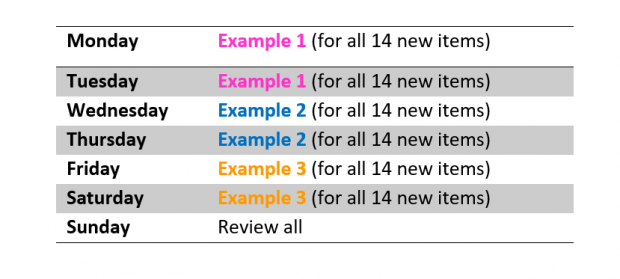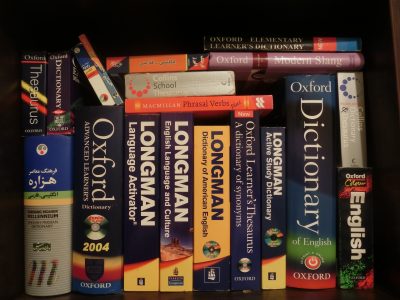By Kaveh Tagharobi
In my last post, I wrote about the importance of learning new collocations through reading and listening activities. Now, I am going to discuss how to record, practice, and learn those new collocations in a way that you can easily use them in your writing and speaking.
You all might have learned new words and collocations that you either forget after a while or seldom use in your writing and speaking. There are probably a group of words and collocations that you frequently see in different texts, and each time you see them, you wonder what exactly they mean. You might have a vague idea, but you are never a hundred percent sure. Or maybe you recognize and understand the word or collocation upon seeing them, but you don’t seem to remember to use them in similar situations when you write or speak. These are very common issues for many EAL writers and speakers, and in the following paragraphs I am going to introduce some simple strategies to help you learn new words and collocations at a level that they become part of your subconscious knowledge and you can effortlessly use them.
The first step is to create a list where you record the new collocations and words that you come across while reading and listening. Many of you might have attempted this in the past: to keep a list of the new words you learn. But has it helped you learn those words better and remember them more easily? Having an effective way of recording information about newly-learned items is the first step in learning them well. I have seen word lists that stretch like two parallel trains; one train is the new words and the one next to it is the translations. This way of keeping new words is not very helpful. Firstly because translations cannot fully capture the meaning of a word or collocation. We can’t always draw parallels between two languages, and translations do not account for the context in which a word or collocation is used. The second reason why keeping translations is not effective is that it does not provide a meaningful learning opportunity, and therefore it is easier to forget the new word after a while. We need something that offers a deeper understanding of the new collocations, and this is why I recommend keeping example sentences instead of translations or definitions. An example sentence features the new word or collocation in context and provides a much better opportunity to both learn and remember it better.
I recommend my students keep three example sentences for each new word or collocation that they add to their list. The first is the original sentence in which they saw that word or collocation for the first time. The second one is a dictionary example, and the last one is a sentence they make. Keeping these three sentences helps you both understand the meaning of the new item and remember it better. You can also keep a definition from an English-to-English dictionary if necessary.
Here is a sample entry:
Imagine you have a conversation with your friend, Doug, who has been running a hipster hangout downtown for the past few years. Unfortunately for Doug, business hasn’t been looking good lately with the population of people with thick rimmed glasses and messy shag cuts on the decline. (This, obviously, can’t be true so don’t take it as a fact! I am just making stuff up for my example.) Before getting into the red and losing money, Doug decides to go out of business while the profits and costs still balance out. This is when he tells you the historic sentence: “I decided to close the restaurant. It only broke even last year.” If you don’t know what “break even” means, this is your golden opportunity to learn it. Even if you know what it means, but you don’t use it yourself, you can still use the chance to make this collocation a part of your active vocabulary. Recording this sentence allows you to learn the meaning of this collocation in context. In addition, you will always remember it with the story of Doug and the decline of his watering hole that was once bustling with cool people in colourful socks and tight-fitted jeans.
Even if you don’t have a story that you can attach to a new collocation, you can make one. Just like what I did with the story of my imaginary friend, Doug.
Writing up a short paragraph gives you a chance to spend some quality time with your collocation, building a narrative around it, adding fun details to it, and in this way making it more memorable.
In that paragraph, you can also use some of the collocations you have learned before. Can you locate some of the collocations that I inserted into my paragraph about Doug’s restaurant?
Keeping a list, however, is never enough, even if it consists of made-up, real-life, and dictionary examples. To make sure these new items enter your long-term memory, you need to review and practice them, and not just randomly; I think to get the best results, it is important to have a system. One recommendation is to pledge a specific number of new items for each week when you can focus and work on those words and collocations. For example, you can decide that you read for 25 minutes every day and pick at least two useful collocations from every reading session (see my previous post on how to identify useful collocations in reading passages). In this way, you will have 14 new collocations by the end of the week. Then you can focus on reviewing those 14 new collocations the following week (while keeping reading and finding new items for the subsequent week). For reviewing, all you need to do is to remember the sentences in which the new words and collocations are used. If you can’t remember the sentence, you can look at your list and review by reading the example sentences. The reviewing part can also be a little organized. You can focus on the first sentence for all your 14 new collocations on the first two days of the week and then move on to the second and third sentences on the next four days. In this way, you will be reviewing your new items six times a week, going back to each item in a new sentence every two days. Finally, you can review all 14 items on the last day of the week.
 This is not time-consuming at all, since you don’t have to set dedicated time aside for reviews. All you need to do is repeat the sentences in your head during the day. You can do it while taking a walk, waiting in line, or doing daily chores. If you don’t remember the sentence, you just need a glance to remind you of the sentence. Moreover, as you head into next weeks, keep an eye out for the items from previous weeks. If you keep reading regularly, you will encounter those words and collocations again in new texts. Every time you come across one of your old items, go back to your list and put a check mark next to the entry. Once you have at least three check marks next to your entry, you can be more confident that you will not forget it.
This is not time-consuming at all, since you don’t have to set dedicated time aside for reviews. All you need to do is repeat the sentences in your head during the day. You can do it while taking a walk, waiting in line, or doing daily chores. If you don’t remember the sentence, you just need a glance to remind you of the sentence. Moreover, as you head into next weeks, keep an eye out for the items from previous weeks. If you keep reading regularly, you will encounter those words and collocations again in new texts. Every time you come across one of your old items, go back to your list and put a check mark next to the entry. Once you have at least three check marks next to your entry, you can be more confident that you will not forget it.
The next step is to insert the newly-learned words and collocations into your speaking and writing. Have a plan to write a short essay every two weeks and use the new items from the past weeks in it. Also, you can prepare a short speaking using the new collocations and present it during a one-on-one session at the CAC. Don’t wait for opportunities to reveal themselves to you; instead, create chances where you can use the new words and collocations deliberately.
It is also a good idea to review your whole list every month. You will find that there are still words or collocations that you do not have complete mastery over. Write them down on a separate piece of paper and stick it somewhere you can always see. Put it on your fridge or next to your monitor, and in this way, you can review these stubborn words and collocations every time you open the fridge or get a chance to use some of them as you are writing at your desk.
My final tip on this subject is about access: where should you keep your list for the most convenient access? What if you are waiting in line in Biblio and want to take a glance at your list to remember a sentence? In the past, I kept my lists in notebooks, which is not the most accessible format. I most probably won’t have my notebook with me when I am taking a walk or standing in line. For a while, I kept my lists in Word files, which was better, but still I had difficulty copying them from device to device. My final solution is to keep my lists on a cloud-based note-taking app. There are several such apps out there that allow you to keep, organize, and update your notes in a space that automatically uploads them to a cloud server. I use Evernote because I think it offers great options to organize your notes. On Evernote, you can create notebooks and keep several notes in the same notebook. You can also group notebooks together under a single topic. This is especially useful if you keep multiple lists, which I recommend. Based on where you find your new collocations, you can have different lists for formal, informal, and academic words and collocations. You can also keep collocations that you have seen before (but can’t quite use) in a separate notebook. Beside allowing you to organize your notes in different notebooks, Evernote synchronizes your data across different devices (you can install it on iOS, Android, and Windows), and you can also access them through your web browser on any device.
 Of course, this is only one of many apps where you can keep your lists. Or maybe you want to go old school and stick to the good old paper notebooks. As long as you regularly add to, review, and use your new words and collocation, you will continue to learn and grow as a writer and speaker. In the end, I believe what is most important is that you have purpose, enthusiasm, and a clear plan to add to and expand your vocabulary. So let’s get started. What is the next new collocation you are learning?
Of course, this is only one of many apps where you can keep your lists. Or maybe you want to go old school and stick to the good old paper notebooks. As long as you regularly add to, review, and use your new words and collocation, you will continue to learn and grow as a writer and speaker. In the end, I believe what is most important is that you have purpose, enthusiasm, and a clear plan to add to and expand your vocabulary. So let’s get started. What is the next new collocation you are learning?
About Kaveh

Kaveh Tagharobi has two MA degrees in English, the second one completed at UVic in 2017 with a concentration in Cultural, Social, and Political Thought (CSPT). Before starting to work at the CAC in 2013, he was an ESL/EFL instructor for 10 years in Iran, teaching a variety of topics to high school, undergraduate, and graduate students. At the CAC, Kaveh works with both international and domestic students, helping them to plan their research, organize their writing, edit for grammar, and improve their reading and critical thinking skills.


